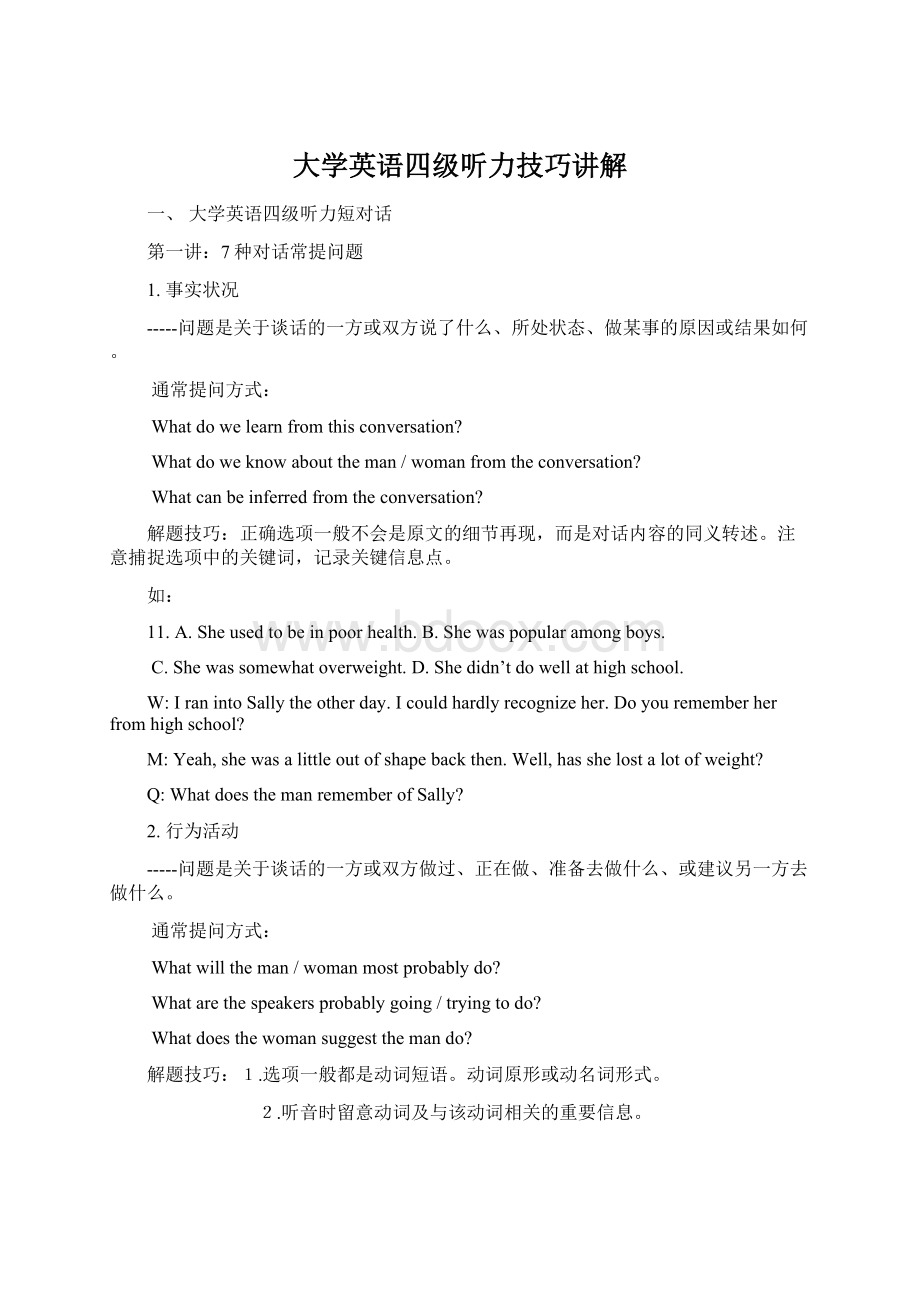大学英语四级听力技巧讲解.docx
《大学英语四级听力技巧讲解.docx》由会员分享,可在线阅读,更多相关《大学英语四级听力技巧讲解.docx(19页珍藏版)》请在冰豆网上搜索。

大学英语四级听力技巧讲解
一、大学英语四级听力短对话
第一讲:
7种对话常提问题
1.事实状况
-----问题是关于谈话的一方或双方说了什么、所处状态、做某事的原因或结果如何。
通常提问方式:
Whatdowelearnfromthisconversation?
Whatdoweknowabouttheman/womanfromtheconversation?
Whatcanbeinferredfromtheconversation?
解题技巧:
正确选项一般不会是原文的细节再现,而是对话内容的同义转述。
注意捕捉选项中的关键词,记录关键信息点。
如:
11.A.Sheusedtobeinpoorhealth.B.Shewaspopularamongboys.
C.Shewassomewhatoverweight.D.Shedidn’tdowellathighschool.
W:
IranintoSallytheotherday.Icouldhardlyrecognizeher.Doyourememberherfromhighschool?
M:
Yeah,shewasalittleoutofshapebackthen.Well,hasshelostalotofweight?
Q:
WhatdoesthemanrememberofSally?
2.行为活动
-----问题是关于谈话的一方或双方做过、正在做、准备去做什么、或建议另一方去做什么。
通常提问方式:
Whatwilltheman/womanmostprobablydo?
Whatarethespeakersprobablygoing/tryingtodo?
Whatdoesthewomansuggestthemando?
解题技巧:
1.选项一般都是动词短语。
动词原形或动名词形式。
2.听音时留意动词及与该动词相关的重要信息。
3.注意表示请求或建议的句式。
如:
Whydon’tyou…?
Whatabout…?
Let’s…You’dbetter….IfIwereyou,Iwould…,I’dliketo…,Youmightaswell…
如:
11.A.Givehisankleagoodrest.B.Treathisinjuryimmediately.
C.Continuehisregularactivities.D.Becarefulwhenclimbingsteps.
M:
Todayisabaddayforme.Ifelloffastepandtwistedmyankle.
W:
Don’tworry,usuallyankleinjurieshealquicklyifyoustopregularactivitiesforawhile.
Q:
Whatdoesthewomansuggestthemando?
(Wound,injury,heal,treat,rigorousactivities,twistone’sankle)
3.观点态度
----问题是关于谈话的一方对另一方或第三方的行为、品德、观点等的态度或评价。
通常提问方式:
Whatdoesthewoman/manmean/imply?
Howdoesthewoman/manfeelabout…?
Whatdoesthewoman/manthinkof..?
解题技巧:
1.对话中一般含有一些引出观点态度的动词或短语,如think,believe,find,guess,imagine,consider,asfarasIknow
2.熟悉表示观点态度的常见词语。
赞成:
approve(of),agree,share,prefer,wise,reasonable,favorable,befor,beinfavorof
反对:
disapprove,objectto,disagree,unwise,ridiculous,foolish,childish,beagainst,unreasonable
赞赏:
admire,appreciate,thinkhighlyof,thinkmuchof,excellent,wonderful,fascinating
喜欢:
love,enjoy,befondof,bekeenon,sth.Istoone’staste,toone’sliking不喜欢:
don’tcaremuchfor,dislike,hate,don'thaveatastefor,sth.Isnottomytaste,
厌烦:
dislike,feelbored,sth.Isboring,betiredof,befedupwith,can’tstand/bear..anymore,can’ttolerate..
关心:
careabout,beconcernedabout,showconcernabout,careful
怨恨或生气:
hate,hatred,angry,anger,feelirritated,feelupset,annoyed,resentdoingsth.
害怕或担心:
fearful,frightened,worried,nervous,feelanxious
批评或讽刺:
becriticalof,criticize,findfaultwith,blamesb.for,ironic
失望或灰心:
loseheart,feelfrustrated,disappointed,discouraged,letsb.Down
表示后悔或遗憾:
regret,regretful,unfortunately,pity,pitiful,shame
表示漠然或热情:
beindifferentto,bedetached,unconcerned,beenthusiasticabout,havegreatpassionfor,bepassionate,becrazyabout
表示积极或消极:
active,positive,passive,negative
表示自信或自负:
confident,beproudof,takepridein,beconceited,bearrogant
表示乐观或悲观:
optimisitc,pessimistic
3.把握说话人的语气。
4.注意表示转折等的逻辑关系标识性词语,如but,yet,instead,while,whereas等,因为这些词引出的句子常表示说话人的真实观点或态度。
如:
15.A.Thewomanpossessesanaturaltalentforart.
B.Womenhaveabetterartistictastethanmen
C.Heisn’tgoodatabstractthinking.
D.Hedoesn’tlikeabstractpaintings.
W:
Ireallylikethoseabstractpaintingswesawyesterday.Whatdoyouthink?
M:
Iguessit'ssomethingIhaven'tacquiredatasteforyet.
Q:
Whatdoesthemanimply?
4.身份关系
===问题是关于谈话的一方或双方的职业、身份或对话双方的关系等。
通常提问方式:
What’sthewoman’sjob/occupation?
Whoisthemantalkingto?
Whatistherelationshipbetweenthespeakers?
解题技巧:
1.注意称呼语。
称呼语直接暴露说话人身份或说话双方关系。
如Mr.,Professor
2.捕捉人物语气。
师生、夫妻、家长与孩子、老板与员工之间的说话方式和语气均有自己的特点。
3.熟悉常考职业身份及相关词语。
Professor,doctor,boss,secretary,waiter,waitress,host,hostess,修理工(repairer,plumber,electrician),(旅馆、事务所、诊所、理发馆等雇用的)接待员.(receptionist),clerk,librarian(图书管理员),shopassisstant,
4.熟悉常考人物关系:
colleague,landlord/landlady---tenant,
如:
A.Apainter.B.AmechanicC.AporterD.Acarpenter
M:
Ifyoucanmakeupyourmindaboutthecolor,Icanstartontheoutsideofyourhouseearlynextweek.
W:
Well,rightnowIthinkIwantwhiteforthewindowframesandyellowforthewalls,butI'llletyouknowtomorrow.
Q:
Whoisthewomantalkingto?
5.地点场景
---问题是关于对话发生的场合、地点或者对话中涉及到的人或事物所处的位置。
通常提问方式:
Whereistheconversationmostprobablytakingplace?
Wherearethetwopeople?
解题技巧:
1.单个地点题:
抓住与特定地点相关的常用词语。
此类对话一般不会提到具体场所,要求根据对话内容去推测场所或某人去向。
2.多个地点题:
对下选项地点相关的细节内容进行速记,并注意抓住提问中的核心词。
3.熟悉常考地点场景及相关词语。
机场attheairport书店inthebookstore/bookshop飞机上ontheplane邮局atthepostoffice火车站attherailwaystation银行inthebank理发店atthebarber’s旅馆inthehotel图书錧inthelibrary餐馆attherestaurant诊所或医院intheclinicorhospital学校或校园atschooloroncampus
如:
A.Onatrain.B.Onaplane.C.Inatheater.D.Inarestaurant.
W:
MayIseeyourticket,please?
Ithinkyou’resittinginmyseat.
M:
Oh,you’reright.Myseatisinthebalcony.I’mterriblysorry.
Q:
Wheredoesconversationmostprobablytakeplace?
(balcony1)阳台2)剧院里的包厢)
6.谈话话题
---问题是关于对话双方所谈论的话题或对象。
通常提问方式:
Whataretheytalkingabout?
Whatarethespeakerstalkingabout?
解题技巧:
1.根据选项特点判断问题类型。
这类题选项的概括性强,且常为名词性短语。
另外,各选项所述内容往往差别较大。
2.捕捉与话题相关的关键词。
3.注意不要只从对话一方的话语中寻找答案。
如:
A.Atragicaccident.B.Asadoccasion
C.Smith’sunusuallifestoryD.Smith’ssleepingproblem
W:
DoyouhearMr.Smithdieinhissleeplastnight?
M:
Yes,it’sverysad.Pleaseleteverybodyknowthatwhoeverwantstomayattendthefuneral.
Q:
Whatarethespeakerstalkingabout?
7.数字信息
---问题是关于时间、年龄、数量、速度、价格等信息。
通常提问方式:
WhattimedidSuzyleavehome?
Howmuchdoesoneticketcost?
Whenisthetrainleaving?
解题技巧:
1.速记信息。
此类题一般不会只出现一个数字,因此一定要对出现的数字及相关要点信息进行速记。
2.听清问题。
必须清楚是针对什么提问,然后才能根据记录的信息将答案对号入座。
3.不要轻易直摄答案。
此类题的答案一般不会是原文中数字信息的再现,往往需要经过简单的运算才能得出答案。
如:
AAt10:
30B.At10:
25C.At10:
40D.At10:
45
M:
Sowhenaretheotherguysgoingtogethere?
Thetrainisleavingin10minutes.Wecan’twaithereforever.
W:
It’s10:
30already.They’resupposedtobeherebynow.Itoldeverybodytomeethereby10:
15.
Q:
Whenisthetrainleaving?
第二讲9种对话常含句式
一、转折句式:
一般先说明原本的意图或情势,然后经转折词进行转折来说明后来的实际想法或事实结果。
设题点往往在转折词之后。
如:
AShewantstogetsomesleep.B.Sheneedstimetowriteapaper.
C.Shehasaliteratureclasstoattend.D.Sheistroubledbyhersleepproblems.
M:
Howaboutjoiningmeforacupofcoffee?
W:
I'dloveto,butI'mexhausted.Iwasuptill3thismorning,writingapaperformyliteratureclass.
Q:
Whydoesthewomandeclinetheman'sinvitation?
二、虚拟句式
1.if虚拟条件句if从句主句
与现在事实相反过去式(were/did)would/should/might/coulddo
与过去事实相反过去完成式(haddone)would/should/might/couldhavedone
与将来事实相反shoulddo/weretodowould/should/might/coulddo
如:
A.Givetheringtoapoliceman.B.Waitfortheowneroftheringintherestroom
C.Handintheringtothesecurityoffice.D.Taketheringtotheadministrationbuilding.
W:
Ifoundanexpensivediamondringintherestroomthismorning.
M:
IfIwereyou,Iwouldturnitintothesecurityoffice.Itisbehindtheadministrationbuilding.
Q:
Whatdoesthemansuggestthewomando?
2.wish后的虚拟语气
如:
A.Themanregretsbeingabsent-minded.B.Thewomansavedthemansometrouble.
C.ThemanplacedthereadinglistonadeskD.Thewomanemptiedthewastepaperbasket.
M:
IwishIhadn’tthrownawaythatwaitinglist.
W:
Ithoughtyoumightregretit.That’swhyIpickeditupfromthewastepaperbasketandleftitonthedesk.
Q:
Whatdowelearnfromtheconversation?
3.Ithought“原以为。
。
。
”,但事实并非如此。
如:
A.FivelessonsB.ThreelessonsC.TwelvelessonsD.Fifteenlessons
W:
ProfessorClarksaidthatthemid-termexamwouldcoverthefirst15lessons.
M:
Really?
Ithoughtitonlyincludedthefirst12lessons.ThenImustspendtheweekendtogoovertherestofthelessons.
Q:
Howmanylessonsmustthemanreviewovertheweekend?
4.ifonly后的虚拟语气“要是。
。
。
就好了。
”
如:
A.Theyenjoyedthepartybetterthantheotherguests.
B.Theyknewnoneoftheotherguestsattheparty.
C.Theydidn’tthinkmuchofthefoodanddrinks.
D.Theywentalongwaytoattendtheparty.
M:
Ithinkthehostessreallywentoutofherwaytomakethepartyasuccess.
W:
Yes.Thefoodanddrinksweregreat.Butifonlywehadknownafewoftheotherguests.
Q:
Whatdidthetwospeakerssayabouttheparty?
5.含蓄虚拟条件句
假设的情况并不以条件从句的形式表示出来,而是通过without,butfor,butthat,otherwise,or等词或短语引出。
如:
A.Shesuggestedawayoutofthedifficultyfortheman.
B.Shetookthemantowherehewantedtogo.
C.Shecamealongwaytomeettheman.
D.Shepromisedtohelptheman.
M:
Thankyouforyourhelpfulassistance.Otherwise,I’dsurelyhavemissedit.Theplaceissooutoftheway.
W:
Itwasapleasuremeetingyou.Goodbye!
Q:
Whydidthemanthankthewoman?
6.shouldhavedone本该做却没做shouldn’thavedone本不该做却做了,needn’thavedone本不必做却做了
如:
A.Themandidnotbelievewhatthewomansaid.
B.Themanaccompaniedthewomantothehospital.
C.Thewomanmaybesufferingfromrepetitivestraininjury.
D.Thewomanmaynothavefollowedthedoctor’sinstructions.
W:
YouseeIstillhavethispaininmyback,thismedicinethedoctorgavemewassupposedtomakemefeelbetterbynow.
M:
Maybeyoushouldhavetakenitthreetimesadayasyouweretold.
Q:
Whatdowelearnfromtheconversation?
7.couldn’thavedone+形容词或副词比较级:
否定形式表肯定意义。
“再不能更。
。
。
”=非常
如:
AShe’sneverwatchedabettergame.B.Footballisherfavoritepastime.
C.Thegamehasbeencancelled.D.Theirteamplayedverybadly.
M:
I’msorryImissedthefootballgame,butIhadaterriblecold.
W:
Youdidn’tmissanything.Wecouldn’thaveplayedworse.
Q:
Whatdoesthewomanimply?